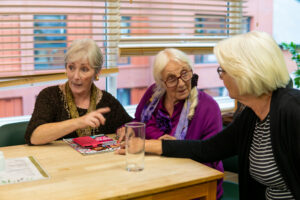The Elder care jargon buster – 49 care terms and their meaning
Tags
Family Support
Like every sector, social care has a lot of its own terminology which can be difficult to get your head around, especially if you’re facing a challenging time and just want to get things sorted.
In this glossary, you’ll find some of the meanings of common terms you may come across when exploring your care options, as well as further information if you need it.
A
Acute care – A form of short-term treatment people will receive for an illness or injury in hospital.
Adult at risk – An adult at risk is anyone over the age of 18 who may be in need of extra support due to a learning disability, physical disability, sensory impairment, mental health problem or their age. They may be unable to take care of themselves or protect themselves from harm. Before the Care Act 2014, an Adult at Risk was referred to as a ‘vulnerable adult’ but this term is no longer used.
Adult day care – Dedicated centres within local communities where adults can go to socialise and get practical assistance from trained staff and volunteers. They cater for people who require a lower level of care. Day care centres offer a range of social activities such as singing, quizzes and games, gentle exercise and arts and crafts. Age UK is probably the largest and most well-known organisation that runs day centres.
Advance care planning – The process of thinking about and recording your own, or your loved one’s wishes and preferences for future treatment and care. An important part of this is making sure that other people know what you or your loved one wants and which things will benefit quality of life the most.
Advocacy – An independent service that helps you get your voice and wishes heard when arranging care. Advocates support you through complex processes and help you make the right choices. Advocacy is especially useful for disabled people, or people facing mental health difficulties, who may face certain challenges when making health care decisions. Learn more here.
Assisted living – Assisted living facilities (also known as extra-care housing, supported living or residential assisted living) is a type of care and support that helps people to maintain a sense of independent living. A person or a couple moves into a specialist housing complex in their own unit – usually a self-contained flat, with its own front door. Staff are on hand to offer assistance 24/7. Read more here.
C
Care Act 2014 – The law that sets out how care and support should be provided to adults and older people, and how it is paid for. It makes it much simpler to understand the process of applying for care and funding through a local council, and helps you know your rights so that you can challenge any decisions you think are wrong.
Capacity – The extent to which your loved one’s condition allows them to process information, make their own decisions, and communicate. Capacity may be affected by a mental health condition such as bi-polar disorder, or a progressive medical condition such as dementia.
Carer’s allowance – A benefit for people who are providing unpaid care to someone, most often a family member or friend. Eligibility depends on how many hours of care you provide per week, how much you earn, and the benefits the person you’re caring for is receiving. Learn more here.
Carer’s assessment – A council assessment for your own needs if you’re providing unpaid care to someone. The assessment will find out whether you’re eligible for support such as mental health counselling or specialist training to help you provide care safely. Find out more here.
Care needs assessment (sometimes referred to as a community care assessment) – The assessment the local council will do to work out your or your loved one’s care needs and the social care services required. You’ll have to complete this if you’re applying for funding from your council. Find out more here.
Care Inspectorate – An independent regulator of care in Scotland (Care Inspectorate Scotland – CIS) and Wales (Care Inspectorate Wales CIW). They look at the quality of care provided by care homes and certain care agencies in their country to ensure it meets the right standards, and highlight where care providers need to make improvements.
Care plan – Usually provided by the council if you or your loved one is eligible for care through an adult social services department. It’ll detail the level of care needed, and how these needs will be met.
The Care Quality Commission (CQC) – The independent regulator of health and adult social care in England. Care homes and care agencies that provide certain types of services need to be registered and monitored by the CQC.
CQC / CI / CIW Regulated – A care agency that operates under the guidance of their country’s independent regulator, such as the Care Quality Commission. Find out more here
D
Delayed discharge / Delayed Transfer Of Care (DTOC) – When you or your loved one is well enough to leave hospital but can’t due to a lack of available care at home or elsewhere. Find out more about arranging care after a hospital discharge here.
Discharge To Assess (D2A) – A process for arranging the care and support a person needs once discharged from hospital, if they’re not ready or well enough to be fully independent. A D2A team can be made up of physiotherapists, occupational therapists, social care workers, nurses and GPs, who’ll assess their needs and discharge them through one of four pathways. Pathway 0 – no support needed, pathway 1 – support provided at home, pathway 2 – temporary support in a care home, or pathway 3 – on-going nursing care in a nursing home.
Direct payments – A way you can choose to receive council funding for care. It gives you control over how you spend it, for example which care provider you choose.
Disclosure and Barring Service (DBS) – A criminal record check carried out when a professional is required to work with vulnerable adults. All carers on Elder’s platform are DBS screened before they are able to work.
Domiciliary care – A broad term for any type of care taking place in your or your loved one’s own home. Today it’s more commonly referred to as ‘home care’. Find out more here.
Find your ideal carer
We have connected over 5,ooo families and carers across the UK. Search for yours today.
E
End of life care –The final stage of palliative care, for people in the final months of their life. It helps people live as well as possible while protecting their wishes and preferences. Different health and social care professionals can be involved in end of life care, for example A GP, district nurse, and care worker. End of life care also supports a person’s family and loved ones both practically and emotionally.
F
Family caregivers – A term for family members who provide care and support to a relative themselves. You’ll likely be considered a family caregiver if you’re helping a loved one with everyday activities like personal care, taking medication, cooking, running errands, and attending medical appointments.
Financial assessment – A council assessment to work out how much you or your loved one needs to pay towards care. Find out more here.
H
Hospice care – Care that aims to improve the quality of life and wellbeing of people who are living with a terminal illness, or life-limiting condition. Hospice care can happen at any stage of an illness, not just the final months or days. It can help with managing symptoms as well as providing social activities and emotional support. Hospice care can be arranged at home, or in a dedicated hospice – either as a full time resident or outpatient. To receive hospice care you’ll need a GP referral.
I
Indicative budget – This is the estimated amount of money that’s needed to meet your eligible care and support needs following your care needs assessment and financial assessment with your local council. Knowing roughly how much you can expect to receive can help you plan the type of care and support you’d like.
Intermediate care – A type of short-term care usually provided after a hospital stay. It aims to help you recover, increase your independence, and reduce the risk of being readmitted. The NHS may offer you 6 weeks of intermediate care free of charge once you’re discharged from hospital. It may sometimes be called ‘convalescent care’.
Introductory provider / agency – companies who introduce those in need of care to suitable self-employed care professionals. While recognised by the independent regulators, they don’t need to register with them as they let families and carers decide the best way for care to be provided, rather than directing it themselves.
Integrated Care Board (ICB) – Regional NHS organisations responsible for planning and meeting the health needs of local residents – like a council, but for NHS matters. They’ll decide if you’re eligible for NHS Continuing Healthcare funding.
M
Managed service provider – A provider that’s accountable for all aspects of the care service they offer. This includes hiring and training carers, creating a care plan, and directing how care is delivered day to day. You can find out more about how managed service providers work here.
Meals on wheels – This is a support service offered by most local councils. For a small weekly fee they’ll arrange home-delivered meals that can either be eaten straight away or easily reheated in the microwave. Different councils offer different services, and there are a number of private companies that offer a paid meal delivery service too. Find out more here.
Memory care – Specialist care for people with dementia. It can involve things like stimulating brain games and activities and memory enhancing therapies such as music, art, or aromatherapy. If provided in a care home, the facility may also offer a carefully designed layout such as contrasting colours to make it easier for people with dementia to get around.
N
NHS Continuing Healthcare (CHC) – Care funding for people with on-going, complex health issues. If you or your loved one is eligible CHC should cover all your care costs. Find out more here.
Nursing care – Care that needs to be delivered by trained nurses, or under their guidance. It involves things like administering controlled medication or injections and wound care. Nursing care can be delivered at home by visiting district nurses, or in skilled nursing facilities such as a nursing home. Find out more here.
O
Occupational therapist – Therapists who help people manage daily life as independently as possible. They may do a home assessment and make recommendations of ways to adapt the home to make it more accessible. They can also offer advice on how to make certain tasks easier. If you’re living with a physical disability, are recovering from an illness or operation, or are simply getting older and finding daily living difficult a GP may refer you to an occupational therapist.
Understanding care options - Helen's story
“My dad, Jim, is 92 and was living independently until fairly recently. In January he sadly had a minor stroke and was admitted to hospital, and it really set him back. He was discharged too soon, and really couldn’t cope back at home – it was a very worrying and stressful time, never knowing if he was safe.
The whole time he was in hospital he was just desperate to get home. He was so unhappy, he was even saying he would discharge himself. My sister and I were looking round trying to find a solution. We knew a care home wasn’t right for him.
We had heard of live-in care, but I wasn’t sure how to go about setting it up. I found the Elder website and called, and I quickly spoke to a lovely man called Andy. He was great at explaining the whole process to me simply, and we took it from there. Elder was also the only company we spoke to who were able to provide the right type of care we needed.
P
Palliative care – A type of care for people living with chronic diseases, or life-limiting illnesses. Many people begin palliative care after receiving a diagnosis to control symptoms, plan for their future care and improve their quality of life. It’s usually delivered by a palliative care team made up of medical professionals, carers, social workers, counsellors and sometimes a religious group, if your faith is important to you. Find out more about how it works here.
Personal budget – The final, agreed amount of care funding the council will award you if you’re found eligible for funding.
Personal health budget – Similar to a personal budget, a personal health budget is an amount of money that is allocated to you to support your health and wellbeing needs. However it’s provided by the NHS, rather than the local council. You’ll receive a personal health budget if you’re eligible for NHS Continuing Healthcare funding.
Personal assistant – Another word for carer or care professional. Personal assistant is sometimes used by social workers and health professionals.
Person-centred – care that focuses on your or your loved one’s needs, values and preferences. It ensures these guide clinical and care decisions, and that the care you receive is respectful of them.
Personal care – This type of care supports personal hygiene and the more intimate aspects of everyday life. Things like getting washed and dressed, toileting, shaving and nail care, skin care, and hair care. It may also involve prompting medication and STOMA and catheter care depending on the provider you choose. In Scotland, anyone over the age of 65 will receive funding of £233.10 per week for personal care services. Find out more here.
Physical disability – This is defined as a “limitation on a person’s physical functioning, mobility, dexterity or stamina.’ Under the Equality Act, if you’re living with a condition that has – or is expected to have – a serious effect on daily living for at least 12 months, then it is classed as a physical disability and you could be eligible for some support.
Physical therapist / physiotherapist – Health care professionals who help restore movement and function for people with disabilities, or who have experienced an illness or injury. Physical therapy can involve practical information and advice, tailored exercises, and manual therapy, where the therapist will use their hands to help ease pain and stiffness in the body. It can sometimes include water based therapy (hydrotherapy) to help move the body without weight bearing.
Power of Attorney – A legal document that allows your loved one to give someone they trust the authority to make decisions on their behalf if they’re no longer able to. Find out more here.
Primary care network (PCNs) – Groups of NHS GP practices working closely together alongside community, mental health, social care, pharmacy, hospital and voluntary services. The aim of PCNs is to provide people with more personalised and cohesive health and care experience.
Protecting Vulnerable Groups (PVG) – Similar to a DBS, this is the criminal record check for Scotland. All carers on Elder’s platform that are based in Scotland are PVG screened before they are able to work
R
Reablement – this is part of intermediate care focused on helping you relearn how to do daily tasks like cooking meals and washing.
Residential care – A type of care given to people in a dedicated facility, rather than in their own homes. It requires people to move into the facility in order to receive 24 hour support with daily living including personal care, such as getting washed and dressed, going to the toilet and taking medication. Care homes offer residential care.
Respite care – A short-term care service that provides the regular carer with a break by taking over their care responsibilities. Respite care can be provided in a person’s own home, or may involve a short stay in a residential care home. If you only need a few hours of respite care, an elderly day care centre may be an option too. Find out more here.
S
Service provider – Any company, organisation, or agency that provides care services.
Self-directed support – The Scottish equivalent of the direct payment system. Self-directed support puts you or your loved one in control of care planning and funding.
Speech therapy – Therapy provided by a speech and language therapist. They help people with a variety of conditions, and in elderly care often work with people experiencing communication, eating or swallowing problems due to neurological conditions such as stroke, Parkinson’s disease and dementia.
Safeguarding – Making sure at-risk adults are not being subjected to abuse, neglect or exploitation.
Sources
https://www.ageuk.org.uk/services/in-your-area/day-centres/
https://www.mind.org.uk/information-support/legal-rights/mental-capacity-act-2005/capacity/
https://www.careinspectorate.wales/
https://www.careinspectorate.com/
https://www.cqc.org.uk/
https://www.gov.uk/government/publications/hospital-discharge-and-community-support-guidance/hospital-discharge-and-community-support-guidance
https://hospiceuk.org/
https://www.kingsfund.org.uk/insight-and-analysis/long-reads/primary-care-networks-explained
https://www.imperial.nhs.uk/our-services/speech-and-language-therapy
https://www.nhs.uk/conditions/
https://www.legislation.gov.uk/ukpga/2010/15/contents
https://www.sdsscotland.org.uk/
Read more care guides

How to prepare for a live-in caregiver
Care at home: how to prepare the home for a live-in caregiver A live-in carer can make a massive difference to your loved one’s quality of life, enabling them to

6 tips for finding the right live-in carer
Finding the right live-in carer is a significant and deeply personal decision, impacting your loved one and the entire family. You’re seeking someone trustworthy, compassionate, and highly skilled to provide

The cost of care – everything you need to know
The true cost of care – everything you need to know Discover the true cost of care and explore your funding options with our care funding calculator. Get started Quick
